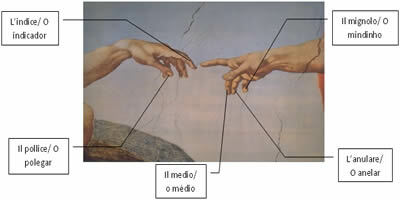THE syntax it is the part of grammar that studies the organization of prayer. To facilitate this study, the sentence (every utterance that has a verb) is divided into terms, which are classified into: members (complements verbal, nominal complement and agent of the liability), accessories (adverbial adjunct, adnominal adjunct, vocative and apostolic) and essential (subject and predicate).
The essential terms, subject and predicate, receive this name because they constitute the essence of the clause, as they represent the basis of the phrases (part of the clause). O subject composes the noun phrase, while the predicate, the verbal phrase.
O predicate it is the part of the sentence in which there is a verb, therefore, there is no predicate that does not have a verb or a verbal phrase. The predicate is essential for the prayer, as it is this term that brings all the information about the subject. So, to facilitate its recognition, it is necessary to detect who is the subject or the vocative, if it does, all that's left is the predicate. In the case of subjectless prayers, what must be considered is the verbal process itself.
The classification of the predicate is related to the type of verb that constitutes it., therefore, if the verb is significant or notional (transitive and intransitive verbs), it will be the core (most important part) of the sentence. Soon, the predicate is classified as verbal, as it contains the verb as its main part. However, when it consists of connecting verb, whose function is not to be a nucleus, but a "bridge" between the subject and the subject predicative, the predicate is classified as nominal, since the nucleus of this predicate is not the verb, but the name, that is, the subject's predicative.
Follow the examples:
I. Love is kind.
II. The book is torn.
III. The bus broke down at Marginal Botafogo.
IV. Vandals break the benches of the Serra Dourada stadium.
As stated before, to detect the type of predicate, it is essential to classify the verb that composes it. Analyzing the examples, it is clear that not all verbs indicate an action or meteorological phenomenon, therefore are not considered significant, as some indicate only the state of the subject, being, therefore, of Link. Returning to the examples, let's classify the predicates?
I. Predicate: is benign. (Nominal Predicate)
II. Predicate: is torn. (Nominal Predicate)
III. Predicate: broke in Marginal Botafogo. (Verbal Predicate)
IV. Predicate: they broke the benches at the Serra Dourada stadium. (Verbal Predicate)
Examples I and II are classified as a nominal predicate, as they have a linking verb and the longer part important, that is, the nucleus, is the subject's predicative, respectively represented by the adjectives: benign and torn. Examples III and IV have notional or significant verbs. Note that the most important information of the predicate is brought by the verb. It is also important to highlight that although it is the same verb (to break) in different contexts, it has predications different, being intransitive in example III and direct transitive in IV.
There are predicates that, in addition to containing a significant or notional verb, also have a predicative that can relate to the subject, classifying itself as the subject's predicative, or it can be related to the verbal complement (direct or indirect object), being called predicative of the object.
When this happens, that is, when in the predicate there are two cores, one verbal and one nominal, the predicate is classified as verb-nominal. See the examples:
I. Supreme Court justices declared the defendant innocent.
II. João it returnedsatisfied.
III. The boy it broke the chair Yellow.
In all the examples, it is noticed the presence of two heads, a verbal and a nominal one, therefore, all the predicates above are classified as verb-nominal.
Summarizing:
verbal predicate: has a verb as its nucleus notional;
Nominal predicate: has the subject's predicative as its core;
Nominal-verb predicate: has two cores, a nominal (predicative of the subject or object) and a verbal (transitive or intransitive verb).
By Mayra Pavan
Graduated in Letters
Source: Brazil School - https://brasilescola.uol.com.br/o-que-e/portugues/o-que-e-predicado.htm

